
Modern Phytomorphology
Scope & Guideline
Connecting Plant Form with Environmental Insight
Introduction
Aims and Scopes
- Plant Morphology and Anatomy:
The journal emphasizes studies on the structural characteristics of plants, including their anatomical features and morphological adaptations to various environmental conditions. - Biochemical and Physiological Studies:
Research on the biochemical processes within plants, including metabolic pathways, phytochemical analyses, and the effects of various treatments on plant growth and development. - Environmental Interactions and Stress Responses:
A core area of focus includes examining how plants respond to abiotic stresses such as drought, nutrient deficiencies, and environmental toxins. - Agricultural Practices and Crop Improvement:
The journal addresses agronomic practices, including innovative cultivation techniques, use of biofertilizers, and genetic engineering aimed at enhancing crop yields and sustainability. - Ecological and Biodiversity Studies:
Research related to the ecological aspects of plant species, including biodiversity assessments and the impact of agricultural practices on native flora.
Trending and Emerging
- Climate Change and Plant Adaptation:
Research examining the effects of climate change, particularly drought stress and temperature fluctuations, on plant morphology and physiology is gaining traction, emphasizing the need for understanding plant resilience. - Innovative Agricultural Technologies:
There is an increasing focus on technological advancements in agriculture, such as the use of biofertilizers and novel pre-sowing treatments, which aim to improve crop productivity while minimizing environmental impact. - Phytochemistry and Functional Studies:
Studies investigating the biochemical composition of plants and their potential health benefits, particularly in relation to food security and nutrition, are emerging as significant themes. - Soil-Plant Interactions:
Research on the interactions between soil conditions, drainage, and plant growth is becoming more prominent, reflecting an integrated approach to understanding plant health and agricultural productivity. - Environmental Toxicology and Plant Health:
The investigation of the effects of environmental pollutants and toxicants on plant physiology is increasingly relevant, highlighting the importance of understanding plant responses to adverse environmental conditions.
Declining or Waning
- Traditional Medicinal Plants:
Research focusing on the use of traditional herbal medications and their applications in modern medicine has seen a decline, possibly due to a shift towards more empirical and biochemically oriented studies. - Taxonomy and Identification Studies:
While taxonomical research remains important, studies specifically focused on the identification and classification of lesser-known plant species appear to be less frequent, reflecting a broader trend towards functional and applied plant sciences. - Historical and Cultural Aspects of Plants:
The exploration of plants in historical or cultural contexts is waning, as the journal increasingly prioritizes empirical research that addresses current environmental and agricultural challenges.
Similar Journals

JOURNAL OF PLANT BIOCHEMISTRY AND BIOTECHNOLOGY
Innovating Tomorrow's Agriculture TodayJOURNAL OF PLANT BIOCHEMISTRY AND BIOTECHNOLOGY, published by SPRINGER INDIA, is a leading publication dedicated to advancing research in the fields of plant biochemistry, biotechnology, agronomy, and crop science. With an ISSN of 0971-7811 and E-ISSN 0974-1275, the journal encompasses a wide range of studies aimed at enhancing our understanding of plant biological processes and their applications in agriculture and biotechnology. It has achieved a noteworthy Q2 ranking in Agronomy and Crop Science and Plant Science, as well as a Q3 ranking in Biotechnology, reflecting its quality and relevance in contemporary research. Notably, the journal ranks #166 in Plant Science and #133 in Agronomy, both falling in the top 67th percentile. With a rich history spanning from 1992 to 2024, the journal is committed to providing open access to innovative research findings that bridge the gap between laboratory discoveries and their practical applications in sustainable agriculture. Researchers, professionals, and students will find a wealth of knowledge and inspiration to advance their work in the dynamic field of plant sciences at this esteemed journal.
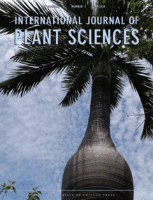
INTERNATIONAL JOURNAL OF PLANT SCIENCES
Innovating research in the world of plant sciences.The INTERNATIONAL JOURNAL OF PLANT SCIENCES, published by UNIV CHICAGO PRESS, is a leading journal dedicated to advancing knowledge in the fields of plant sciences and ecology. With an ISSN of 1058-5893 and an E-ISSN of 1537-5315, this journal has been a prominent platform for groundbreaking research since its establishment, featuring works from 1983 to present. It holds an impressive Q2 ranking in both Ecology, Evolution, Behavior and Systematics and Plant Science, reflecting its reputable standing within the academic community. The journal is well-regarded for its rigorous peer-review process and commitment to high-quality publication standards, making it a favored choice for researchers, students, and professionals eager to engage with the latest findings and innovative methodologies in plant research. While it does not currently operate under an Open Access model, the journal provides ample access options for institutions and individuals keen to explore its curated content. By presenting diverse studies that blend theoretical and practical insights, the INTERNATIONAL JOURNAL OF PLANT SCIENCES plays a critical role in fostering interdisciplinary dialogue and advancing the frontiers of plant science research.
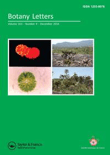
Botany Letters
Connecting Researchers to Transform Plant ScienceBotany Letters, published by Taylor & Francis Ltd, is a prominent journal in the field of Plant Science based in the United Kingdom. With its ISSN 2381-8107 and E-ISSN 2381-8115, the journal has established itself as an essential resource for researchers, professionals, and students alike, focusing on innovative studies and findings in botany. As a Q2 ranked journal in its category (2023) and holding a respectable Scopus rank of #200 out of 516 in Agricultural and Biological Sciences, it reflects a robust commitment to quality and relevance in the field. The journal's open access model ensures that groundbreaking research is readily accessible, fostering collaboration and knowledge sharing among the global scientific community. Covering a broad spectrum of topics within plant science from 2016, Botany Letters aims to catalyze advancements in the understanding and management of plant biodiversity and sustainability, ultimately contributing to conservation efforts and agricultural innovation.

JOURNAL OF PLANT RESEARCH
Cultivating Knowledge, Growing Innovation.JOURNAL OF PLANT RESEARCH, published by SPRINGER JAPAN KK, is a leading academic journal that has carved a niche in the field of Plant Science. With its ISSN 0918-9440 and E-ISSN 1618-0860, this journal has been disseminating high-quality research since its inception in 1993 and continues to be essential reading for academics and practitioners alike, aiming to bridge the gap between innovative plant research and practical applications. The journal is highly regarded, holding a prestigious Q1 ranking in Plant Science for 2023, and is positioned in the top 80th percentile within the Scopus rankings for Agricultural and Biological Sciences. The journal's coverage includes a wealth of topics pertinent to advancing our understanding of plant biology, ecology, and sustainable agricultural practices. Although it operates under a subscription model, its influence in the research community remains profound, making it a vital resource for contemporary studies in plant-related disciplines.

Notulae Botanicae Horti Agrobotanici Cluj-Napoca
Advancing Sustainable Practices in Botany and AgricultureNotulae Botanicae Horti Agrobotanici Cluj-Napoca is a distinguished open-access journal dedicated to the fields of Agronomy, Horticulture, and Plant Science. Published by the University of Agricultural Sciences and Veterinary Medicine Cluj-Napoca, Romania, this journal serves as a vital platform for disseminating cutting-edge research and innovative practices in botany and agricultural sciences. With an Impact Factor that reflects its significant contributions to the field, it has achieved notable rankings, including Q2 in Agronomy and Crop Science and Horticulture, and Q3 in Plant Science as of 2023. The journal has been an open-access publication since 2019, ensuring maximum visibility and accessibility for researchers worldwide. By fostering the exchange of knowledge among scientists, practitioners, and students, Notulae Botanicae plays a crucial role in advancing the understanding and sustainable practices in the horticultural and agricultural sectors. With its continued growth since it converged in 2007, this journal is a vital resource for anyone looking to stay informed on the latest developments in botanical research.

Botanical Studies is a premier open-access journal published by Springer, dedicated to the field of botany and plant sciences. Since its establishment in 2006, the journal has championed innovative research and scholarship that explores diverse botanical topics ranging from plant systematics to ecology and conservation. With a commitment to broad accessibility, it promotes the dissemination of knowledge to researchers, professionals, and students worldwide. Botanical Studies fosters academic collaboration and dialogue, contributing significantly to the global botanical community. Its open-access policy allows unrestricted access to its high-quality, peer-reviewed content, ensuring that vital research is available to all. Join the growing community of scholars advancing botanical science through this essential publication, conveniently located at One New York Plaza, Suite 4600, New York, NY 10004, United States.
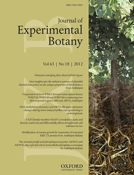
JOURNAL OF EXPERIMENTAL BOTANY
Fostering collaboration in experimental botany.JOURNAL OF EXPERIMENTAL BOTANY, published by Oxford University Press, stands as a premier journal for researchers and professionals in the fields of plant science and physiology. With an illustrious history dating back to 1950, this journal has established itself as a critical resource for advancing our understanding of plant biology and its applications. It is recognized in the top tier of academic publishing, reflected in its Q1 rankings in both Plant Science and Physiology for 2023, and boasts impressive Scopus rankings—placing it in the 96th and 91st percentiles of its respective categories. Though not an open-access journal, it ensures widespread access to groundbreaking research aimed at unraveling the complexities of plant functions and adaptations. As we look toward 2024, the JOURNAL OF EXPERIMENTAL BOTANY continues to play an essential role in fostering innovation, collaboration, and education within this vital area of science.
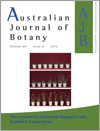
AUSTRALIAN JOURNAL OF BOTANY
Elevating plant research to influence environmental policy.The Australian Journal of Botany is a prestigious peer-reviewed journal published by CSIRO PUBLISHING, dedicated to advancing the field of plant sciences and ecology. Established in 1953, this journal provides a critical platform for researchers to share original research findings, reviews, and perspectives in subjects ranging from plant biology to ecological interactions, with a focus on Australian flora and its conservation. With an impressive impact factor and categorized in the Q3 quartile in both Ecology, Evolution, Behavior and Systematics and Plant Science, the journal ranks competitively within its fields, allowing authors to reach a diverse audience of professionals, students, and fellow researchers. The journal is accessible in print and electronically through its ISSN: 0067-1924 and E-ISSN: 1444-9862, providing wider access to vital research outcomes that influence environmental policies and natural resource management. As it aspires towards innovation and excellence, the Australian Journal of Botany remains an essential resource for those passionate about the richness of plant biodiversity and ecological understanding.
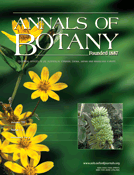
ANNALS OF BOTANY
Cultivating Innovations in Plant ResearchANNALS OF BOTANY, published by Oxford University Press, stands as a leading journal in the field of Plant Science, with a distinguished history that dates back to 1887. This esteemed journal, recognized for its contribution to the advancement of botanical research, holds a prestigious Q1 quartile ranking in its category as of 2023. With a commitment to sharing high-quality, peer-reviewed research, ANNALS OF BOTANY provides a vital platform for researchers, professionals, and students to disseminate novel findings and engage in scholarly discourse. Although it does not currently offer open access options, the journal remains accessible to a wide academic audience, further cementing its role in facilitating the exchange of knowledge within the global botanical community. For those interested in the dynamic and evolving world of plant sciences, ANNALS OF BOTANY is an indispensable resource.

Annali di Botanica
Cultivating excellence in the field of plant sciences.Annali di Botanica is a distinguished journal published by UNIV STUDI ROMA LA SAPIENZA that has become a vital platform for advancing research in the field of plant sciences. With its Open Access policy established since 1995, it ensures that a wide audience including researchers, professionals, and students can access high-quality, peer-reviewed articles that contribute to the global body of botanical knowledge. As of 2023, the journal holds a Q3 rank in the Plant Science category, reflecting its commitment to scholarly excellence and relevance, as evidenced by its position within the 62nd percentile of activities ranked in Scopus. The journal encompasses diverse topics in botany, fostering discussions that encompass morphological, ecological, and genetic aspects of plants, effectively bridging theoretical knowledge and practical applications. Situated in the heart of Rome, Italy, at PIAZZALE ALDO MORO, 5, the journal not only addresses regional botanical issues but aims to serve a global audience, enhancing collaborative efforts and stimulating innovation across the botanical sciences.